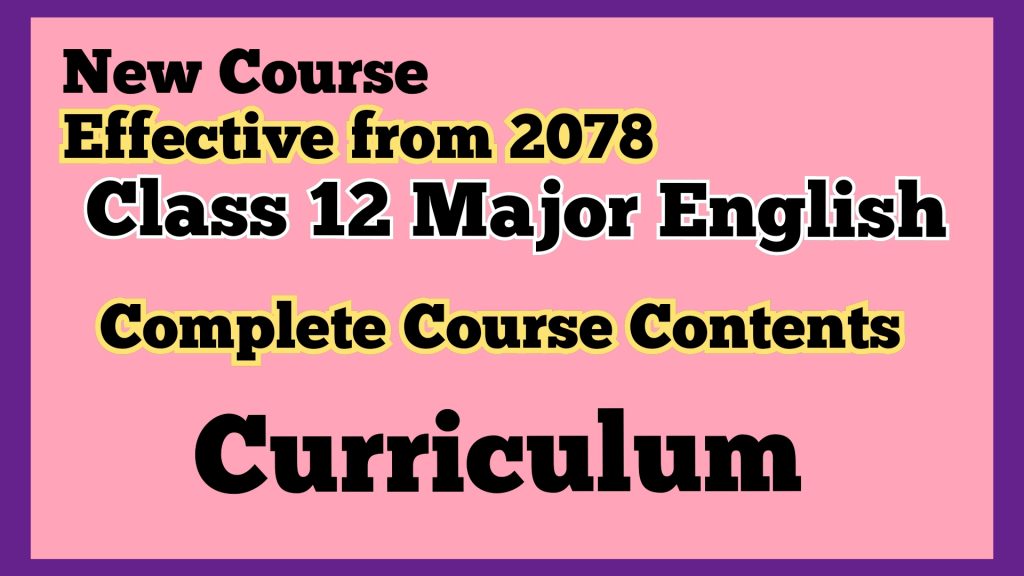New Course Class 12 Major English Curriculum/Course Contents/ Effective from 2078
Secondary Education Curriculum English (Optional) Class 12
Grade: 12 Subject Code: Eng. 334
Content of Grade XII:
| Area/Genre | Contents/Types |
| 1. An Introduction to Language and Linguistics | Language Studies: Language Family, Language Change and Language Death Varieties of Language Issues and Aspects of Language · Language and pedagogy · Multiculturalism
· Multilingualism · Language Rights · Translation |
| 2. Prose (Themes: Science Fiction, Justice and Human Rights, Population and Migration, Love and Marriage, Money, Work and Leisure; Authority and State (power, war, people, politics), Ideals/Values, Diaspora/ Acculturation, Transnationalism, Protest / Rebellion/ Freedom, Religion and Morality (Geeta), Dream and Ambition, Sports and Entertainment, Film and Theatre, Language and Education) | Prose I. Fiction
a. Short stories (Realism, Naturalism, Surrealism) b. Ancient Tales c. Metafiction d. Children’s Stories e. Fantasy II. Non-fiction a. Essays (Narrative, descriptive, argumentative, comparison and contrast, cause and effect, travel account, seminal, classical, modern) b. Memoir c. Blog writing d. Moral values related texts e. Meta language essay |
| 3. Poetry (Themes: Justice and Human rights, Population and Migration, Love and Marriage, Money, Work and Leisure; Authority and State (power, war, people, politics), Ideals/Values, Diaspora/ Acculturation, Transnationalism, Protest /Rebellion/ freedom, Religion and Morality (Geeta), Dream and Ambition, Identity and Alienation) | Poems (Poems by British, American and non-Western poets)
a. Ballads b. Lyrical poetry c. Romantic poetry d. Haiku e. Free verse and modern poems f. Sonnet |
| 4. Drama | A classic play either tragedy or comedy |
| 5. Introduction to Critical Perspectives | 5. Introduction to Critical Perspectives |
Elaboration of Contents and Prescribed Texts for Grade XII
1. An Introduction to Language and Linguistics
| I. Introduction to Language Studies | · Language family: An introduction · The Indo-European family, the Sino-Tibetan family, and the Niger-Congo family
· Languages of Nepal · Language change and language death -Causes of language change: fashion, foreign influence, broadening and narrowing -Language death: language shift; minority, endangered and dominant languages · Varieties of language: pidgin, creole, registers in education, humanities and social sciences, science and technology, law and justice (some examples); BrE and AmE (vocabulary, pronunciation, grammar), Black English Vernacular and Standard American English (some examples) |
| II. Issues and Aspects of Language | · Language pedagogy: the teaching of language and about language, the teaching of contents or skills or both, major shifts in language pedagogy (approaches and methods), English language teaching situation in Nepal · Multilingualism and multiculturalism (as problems or resources in language learning) · Language rights: minority language identity, mother tongue education, language politics · Translation: Source and target languages, types of translation, and techniques of translation |
Prose I. Fiction (Short stories/ancient tales/meta fiction/ children’s stories/fantasy)
| S.N. | Title of the Story | Author | Themes |
| 1 | Brahmadatta and the Bunyan Deer | Buddhist Story | Ancient tales |
| 2 | Cost of Wisdom: The God King Odin’s Tale | Norse mythology | |
| 3 | This is a Story | Jeannette C. Armstrong | Folk Tale, protest/rebellion/children story |
| 4 | Paul’s Case | Willa Cather | Values/children story |
| 5 | Three Students Sir | Arthur Canon Doyle | Detective story |
| 6 | Everything That Rises Must Converge | Flannery O’Connor | Realism/ethnicity |
| 7 | Lullaby | Leslie Marmon Silko | Realism/ethnicity/war/ voice from margins |
| 8 | Samsa in Love | Haruki Murakami | Surrealism/disability/voice from margins |
| 9 | Deal in the Wheat | Frank Norris | Naturalism/ human vs. nature |
| 10 | Leaving | M. G. Vassanji | Realism/migration /Dream and Ambition |
| 11 | Autobiography: A Self Recorded Fiction | John Barth | metafiction |
| 12 | The Lost Child | Mulk Raj Anand | Realism/relation/ children story |
Non-fiction (Essays/memoir/blogs writing/moral value related texts/ meta language essay)
| S.N. | Title of the Essay | Author | Themes |
| 1 | Sir Roger at the Assizes | Richard Steele | Narrative/ Humor / people |
| 2 | An Eastern Journey | Somerset Maugham | Classic |
| 3 | The Case for Xanthippe Argumentative | Robert Graves | Argumentative |
| 4 | Once More to the Lake | EB White | Memoir/ nature/relation |
| 5 | Man and Battle of Life | SiriAurobindo | From Gita (religion, morality) /Cause and effect |
| 6 | Not Nothing | Stephen Crave | Moral values/Ethics |
| 7 | How Lean Production Can Change the World | James P. Womacketal | Comparative/business/industry |
| 8 | A Black Grandmother | Sally Morgan | Autobiography (Acculturation) Narrative |
| 9 | Speech on Release from Jail | Nelson Mandela | Freedom/human right |
| 10 | What is Meta-language? | Lisa Tran | Meta-language |
Poetry (Ballads/lyrical poetry/romantic poetry/haiku/free verse and modern poems/sonnets)
| S.N. | Title of the Poem | Poet | Themes |
| 1 | King Lear and his Three Daughters | George Wharton Edwards (England) | Filial duty /politics/ballad |
| 2 | The Three Knights | Davies Gilbert | Ballad/religion |
| 3 | Mending Wall | Robert Frost | Morality/lyric |
| 4 | No Second Troy | W. B. Yeats | Romantic/lyric |
| 5 | She Dwelt among the Untrodden Ways | Wordsworth | Romantic |
| 6 | If I Should Die | Emily Dickinson | Lyric/values/death |
| 7 | Five Modern Haikus | Richard Wright/Alexis Rotella/Huguette Ducharme/Don Eulert/Ezra Pound | Haiku/nature/imagism |
| 8 | Sonnet 8 | John Milton | War |
| 9 | Kidnapped | Ruperake Petaia | Education/values/ideals |
| 10 | Lord! Make Me a Sheep | Laxmi Prasad Devkota | Rebellion/satire/rights |
| 11 | Abiku | Wole Soyinka | religion, culture |
| 12 | A Woman | Gabriela Mistral | Love/ideal |
Drama:
| 1 | Drama-All My Sons | Arthur Miller | (Classic) |
Evaluation:
| S.N. | Area/Genre | Marks |
| 1 | Introduction to Language and Linguistics | 13 |
| 2 | Prose | 26 |
| 3 | Poetry | 15 |
| 4 | One Act Play/Drama | 10 |
| 5 | Introduction to Critical Perspectives | 11 |
| Total marks | 75 |
Source: www.moecdc.gov.np

